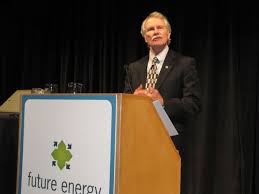
Oregon Governor John Kitzhaber came to San Francisco for lunch last week, and laid out to an intrigued audience of Californians what he thinks is similar -- and different -- between our two states. Kitzhaber, like California's Jerry Brown, is in his second round as governor, having served 2 terms from 1994 to 2002, and then returned in 2010.

Unlike Brown -- or President Obama -- Kitzhaber finds partisan gridlock not his biggest challenge. During his first two years the State Senate was evenly divided between Republicans and Democrats -- and still managed to balance the nation's worst (relative to the size of the economy) deficit. Kitzhaber has also been able to move forward on innovative energy policy steps and health care reforms -- right now the states renewable fuels standard needs renewal, and Kitzhaber expects to get it done -- by recruiting the one additional vote he needs to get it out of committee, from a Republican. His likely Republican opponent next year, Chris Dudley, says that global warming is real and man-made -- but still hedges on how much should be done to combat it.
Oregon, of course, is a less classically "progressive" state than its West Coast neighbors -- maverick has always been the flavor of its politics. One political analyst points out to me that, interestingly, it may be the continued political survival of relatively conservative, rural Democrats in Oregon that has also enabled relatively moderate suburban Republicans to maintain a political power base. Perhaps this greater political fluidity is the source of Kitzhaber's ambition. Oregon is the smallest of the Pacific states, but Kitzhaber has the broadest vision. He wants to forge California, Oregon and Washington into a partnership that leads the entire U.S. into a sustainable, clean energy future. He thinks the region has the economic heft, the innovative leadership, the political positioning (Wyden of Oregon chairs Senate Energy, Boxer of California Senate Environment, Pelosi is the Democratic Leader in the House and Waxman of California Commerce and Energy ranking member) and the geographic sweet spot facing the Pacific to accelerate the shift in the U.S. economy from older, resource and fossil fuel intensive technologies to the sustainable and innovative winners of the 21st century.
Kitzhaber has made a down payment in Oregon. Shortly after returning to office he laid out a ten-year energy plan for the state -- using economic arguments. "The two fastest-growing fixed costs for businesses, individuals and families are energy and health care," he pointed out. "And the fact is that energy is much more in our control than health care." He's taken the lead in urging a careful assessment before approving proposals to export American coal to Asia through West Coast Ports.
The three states have some very difficult problems -- inadequate schools and badly broken revenue systems in California and Oregon in particular. But Kitzhaber is rolling up his sleeves to craft this partnership -- and Kitzhaber, Brown and Washington's Jay Inslee combined bless the West Coast with by far the greenest state leadership that any region of the country has ever enjoyed. So this could be exciting.
After the lunch several of the guests are animatedly discussing how to follow-up on Kitzhaber's vision -- one jokingly suggests that after forging an innovation partnership the Pacific States should simply secede from the U.S. with its Tea Party and Washington, D.C., problems.
"Secession," I demurred, "is for losers. And today's lunch wasn't about losing."
A veteran leader in the environmental movement, Carl Pope spent the last 18 years of his career at the Sierra Club as CEO and chairman. He's now the principal advisor at Inside Straight Strategies, looking for the underlying economics that link sustainability and economic development. Mr. Pope is co-author -- along with Paul Rauber --of Strategic Ignorance: Why the Bush Administration Is Recklessly Destroying a Century of Environmental Progress, which the New York Review of Books called "a splendidly fierce book."